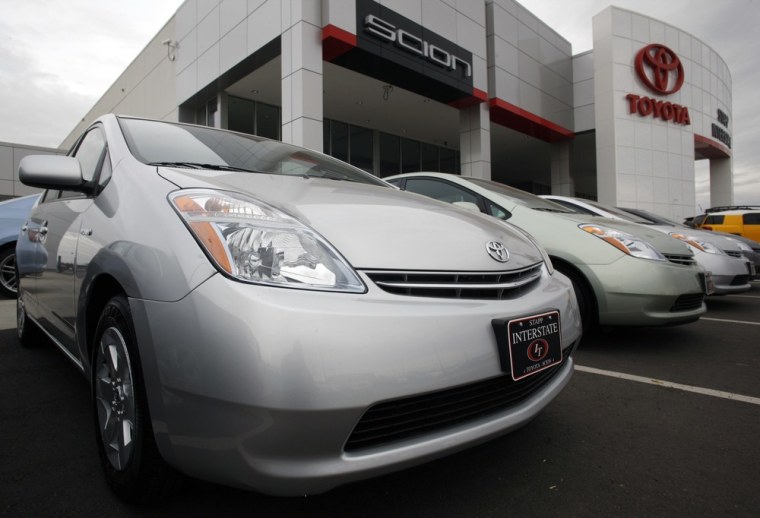You know how you feel when it rains just after you’ve finished polishing your car?
That must be how Toyota feels now .
Just weeks after winning a seeming reprieve from federal safety regulators, the world’s largest automaker may have delivered itself a serious, self-inflicted wound by ordering the recall of another 2.17 million vehicles to repair problems associated with so-called unintended acceleration.
Thursday’s news brings to 14 million the number of vehicles Toyota has recalled since late 2009 due to an unprecedented series of safety-related issues involving matters as diverse as faulty brakes and excessive corrosion. But no issue has been more extensive — nor generated as much concern among the public, media and regulators — as the issue of runaway Toyota products.
The new recall, industry observers warn, could raise anew concerns about a company that has traditionally had a reputation for building bulletproof, safe and highly reliable products, and it could force Toyota to ramp up the already hefty incentives it has had to offer to counter a rare slide in sales.
The first big Toyota recall, in October 2009, involved millions of vehicles in which loose carpets or floor mats might jam the accelerator pedal and make it difficult to slow down. (A second recall, in January 2010, involved sticky accelerator assemblies.)
The newest safety action is similar in nature to the first of those recalls and involves a wide range of models sold through the Toyota and up-market Lexus brands, including 761,000 Toyota RAV4 crossover vehicles, and 372,000 Lexus RX sport-utility models.
The automaker says it has had no report of accidents or injuries related to the problem. That fits with what senior Toyota executive Bob Carter recently described as a new, more proactive corporate policy towards safety issues.
“If we’re ever even slightly on the edge” when it comes to deciding how to respond to a possible problem, “we’ll announce a recall,” the executive suggested earlier this month at the Chicago auto show.
That conversation came shortly after Toyota was cleared in an investigation by the National Highway Traffic Safety Administration, a division of the U.S. Department of Transportation, and conducted in cooperation with space agency NASA.
Researchers said there was no evidence that unexplained gremlins in Toyota’s electronic engine control systems might unexpectedly be leading to incidents of runaway products. If anything, researchers had pointed to driver error where, for example, a motorist might reach for the brake and hit the gas pedal, instead.
Following that announcement, which came in early February, a visibly relieved Carter said he had “a spring in my step,” as the carmaker set out to rebuild its tarnished reputation. Indeed, the Transportation Department said Thursday that Toyota’s additional recall of 2.17 million vehicles was sufficient for the agency to close its investigation.
But while the road ahead may have looked clear for Toyota, Thursday’s recall could “snatch defeat from the jaws of victory,” warned analyst Dan Gorrell, of California-based AutoStratagem.
“They were beginning to repair the damage and regain trust, but this strikes at the core emotional concerns people have” about the safety of their vehicles, Gorrell said.
Considering the potential damage, some are asking why Toyota might have expanded upon the original “pedal entrapment” recall. The answer, according to Gorrell, is that the carmaker is “between a rock and a hard place.” The alternative would have been to risk another fight with government regulators and the possibility of a huge fine for failing to act with reasonable haste on a known safety issue.
Similar corporate delays resulted in a series of record fines last year totaling a collective $48.8 million. Indeed, today’s announcement comes exactly a year to the day after Jim Lentz, Toyota’s top-ranking American executive, apologized for the company’s slow response to the runaway car issue during a testy hearing on Capitol Hill.
Nonetheless, Toyota risks losing the momentum it claims it had regained in recent months. According to Carter, internal data show the automaker was largely overcoming the doubts of not only loyal owners but also potential buyers.
That was the biggest risk to the brand, said AutoTrends analyst Joe Phillippi, since Toyota’s growth, over the years, has largely been fueled by “conquesting” customers from competitors, especially Detroit’s “Big Three” automakers — GM, Ford and Chrysler.
But the Japanese giant’s problems have coincided with a nascent revival by the domestic carmakers, especially Ford, which is now routinely besting Toyota in key quality studies from the likes of J.D. Power and Associates, and even Consumer Reports magazine.
The Ford Focus, for example, has been widely hailed as the best new entry into the compact passenger car market, a segment where the Toyota Corolla long dominated. But Corolla also faces tough new entries in the form of Chevrolet’s new Cruze, and also from Korean maker Hyundai, which has just launched an all-new Elantra.
Toyota suffered a rare but significant hit in the marketplace — it was the only major carmaker to suffer a sales decline during the final three months of 2010. The Japanese carmaker’s sales rebounded in January, but only after bumping up its incentives to record levels.
Toyota’s recent slump has been worsened by a shortage of new product for the 2011 model-year, but Carter said he is confident the situation will reverse itself in the months to come with the launch of 2012 models, including an expanded line-up of hybrids sharing the well-known Prius name.
But the newest unintended acceleration-related recall casts a shadow of concern over Toyota, made worse by other recent safety-related actions, including a recall of 245,000 sedans in the U.S. for the potentially faulty installation of fuel pressure sensors. That, analysts like Gorrell warn, could make it much more difficult for Toyota to stage its comeback.
